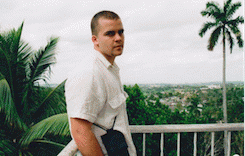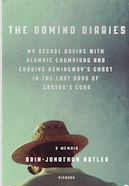This is the conclusion of my recent interview with Brin-Jonathan Butler. [See part one]
I'm talking with Brin-Jonathan Butler, writer, filmmaker and author of The Domino Diaries: My Decade Boxing with Olympic Champions and Chasing Hemingway's Ghost in the Last Days of Castro's Cuba.
JB: A little background, please. Why did Castro ban professional sports in the first place and force top notch athletes and their loved ones into having to make such a heartrending decision regarding leaving forever or staying put in poverty?
BJB: Over a million people have left Cuba since Castro took power. By and large, the first exodus was white Cubans, mostly the wealthy and powerful, those with the most to lose with Castro's plans taking hold in Cuban society. Many didn't take luggage fully suspecting they'd return in a week. The Peter Pan exodus of children in 1964 is one of the most tragic groups that left. Again, the parents of these children imagined the separation would be very, very temporary. It wasn't. The revolution has always been gravely misunderstood and its complexity glibly dismissed. While the Arab Spring was going on, many journalists suspected something similar would take place in Cuba, ignoring the fact that the revolution in Cuba was a bottom-up situation rather than top-down.
Four out of five revolutionaries who marched into Havana couldn't read or write and had virtually no chance for improving the dynamic for their children. For those kind of people, the revolution not only promised but delivered with tremendous improvements to their way of life. Castro banned professional sports on the island to illuminate the symbolic value of Cuba taking on the rest of their world through competition and asserting their dominance on the basis, according to him, of their superior values and determination, without being tethered to financial reward.
The Olympics were created to offer competition in place of war and offer a proxy for tensions between nations and the drive to assert dominance. Cuban athletes were discovered and nurtured by one of the most efficient, brilliantly run sports machines ever created. Cuba, pound for pound, is recognized as one of the most spectacular sporting nations on earth. But as life grew harder in Cuba and there was more incentive for outsiders to exploit that struggle and vampire as much money as they could off athletes, we've seen a trickle turn into opened floodgates for people willing to make the harrowing decision to step inside a smuggler's boat.
JB: Tell us a bit about your documentary, Split Decision.
BJB: Split Decision is a documentary I worked on for the better part of three years, exploring a handful of Cuba's most accomplished boxers since Castro came to power during successive decades from the 70s until present day champions like Guillermo Rigondeaux and the champions of tomorrow, like national junior champion Cristian Martinez. The film explores the consequences and rewards of remaining in Cuba despite the lure of millions to fight professionally abroad and also looks at Rigondeaux's life chasing the American Dream from a smuggler's boat on the way to winning a world championship and considerable money in the professional ranks. The film is also a personal journey for me into Cuban society through the lens of Cuban athletes confronting with this harrowing decision.
JB: I haven't seen Split Decision yet but I'd like to. Your decision to make this film had major consequences regarding your ability to travel to and spend time in Cuba. What can you tell us about that, Brin?
BJB: Split Decision's protagonist, Guillermo Rigondeaux, is one of the most notorious athletic defections in Cuban history. So, as a starting point to gain access on the island, that high concept distillation of the focal point of the story slammed a lot of doors in my face. There was no way to officially gain access in telling the story of one of the most politically radioactive people on the island. So the choice was to give up or find a lot backdoors in at the risk of some serious consequences. But I was in all in----maxed out every credit card, line of credit, borrowed dollar I could find--and so I pressed on and I think luckily, went top-down thereafter rather than bottom-up in whom I approached for interviews. It just so happened when Teofilo Stevenson, the second most famous Cuban in the world after Fidel Castro, let me into his home in Havana he was very drunk and, while on camera, he confessed to a friend he was broke and desperately needed money for the interview.
I knew at that moment the footage I had in my possession, if released, meant never being let back into Cuba. To expose one of Cuba's most famous symbols as an alcoholic who would only discuss all the millions he turned down from America if I agreed to pay him $130 under the table was never going to go over very well. But what it showed to me was simply that there was a cost to turning down all those millions. I never believed he was brainwashed in doing so. After hearing him explain his reasons I believed him. But there was indeed a very cost for his moral high ground. But isn't that fair to offer what anyone should know in the first place?: he's a human being. Rigondeaux in America abandoning his wife and two children back in Havana and everywhere he goes all he cares about is money----if money was enough, I don't believe he would look as sad and in pain as he does.
Again, this is a human being forced to make an impossible decision that nobody should ever have to make. And I wanted to make a film that villainized not people who chose to stay or leave, but the malevolence at the heart of that decision which I felt both American and Cuban policies deserved the blame for. Telling that story was worth my losing the ability to return to a place which is the only one I've ever felt at home. Because I felt I owed it to all those people whose voices weren't heard on the island who had been so kind and generous to me over the years.
JB: When did Split Decision come out and how has it been received so far? I love the name of the film; it's so apt!
BJB: So far Split Decision has only been shown at a New York film festival last autumn where it won the Independent Spirit Award. Everyone involved was very pleased with the response. We're currently looking for distribution and hoping, what with all the immense changes going on with Cuba that put it on the front pages of newspapers around the world, our film, as a time capsule, offers even more richness about a time and place that is no longer available to be seen.
(Note: You can view every article as one long page if you sign up as an Advocate Member, or higher).







